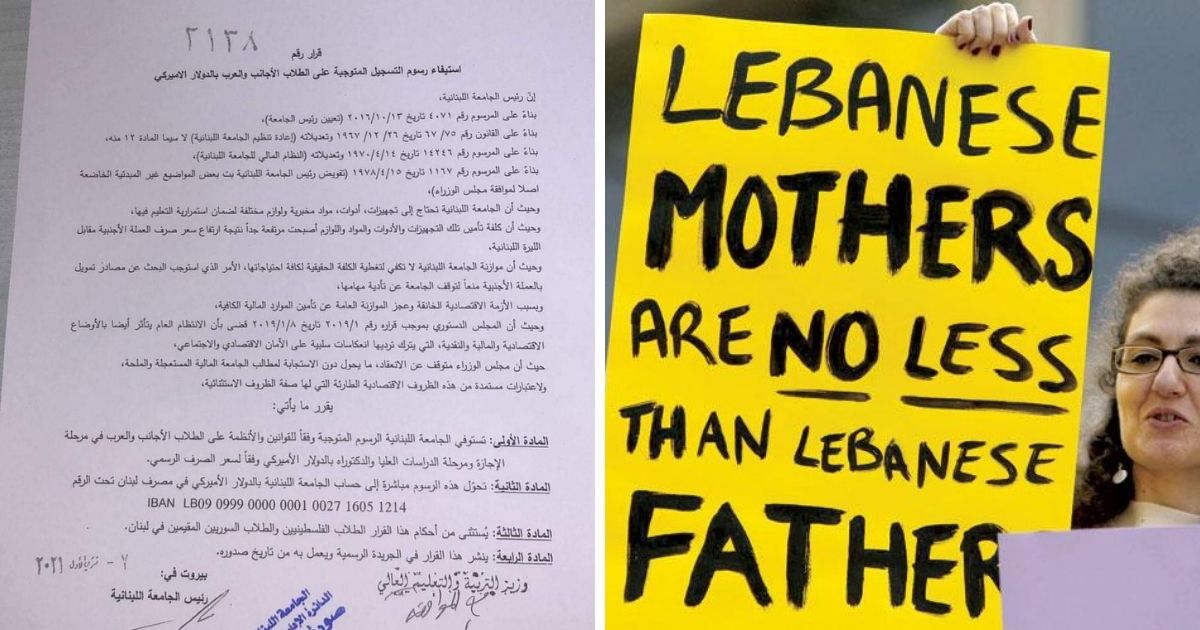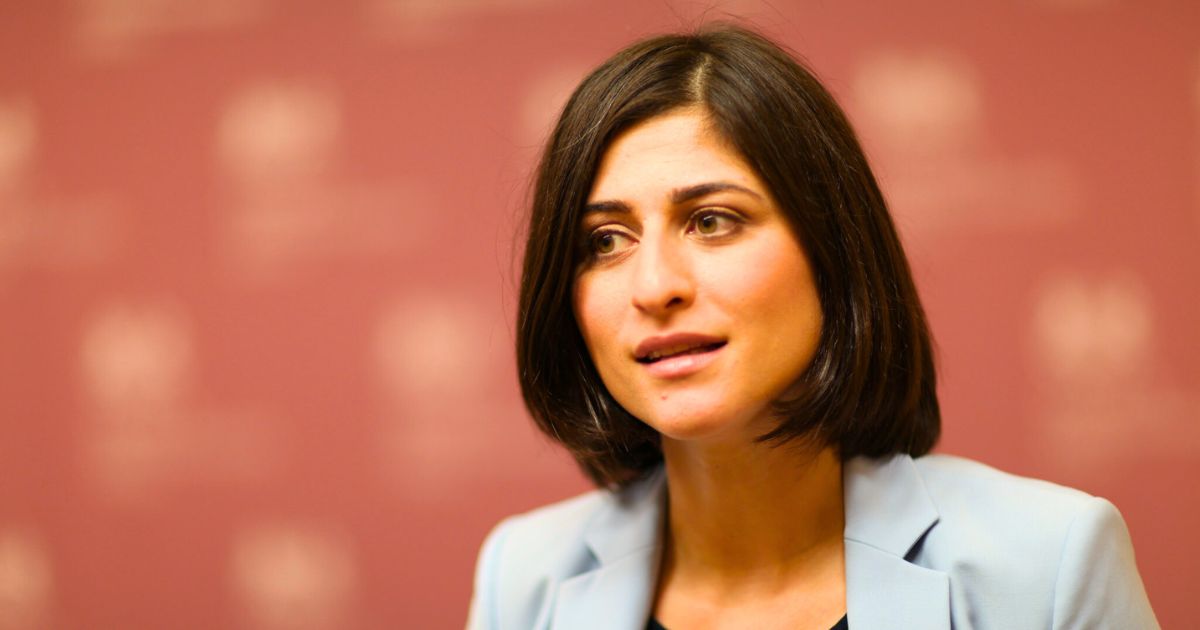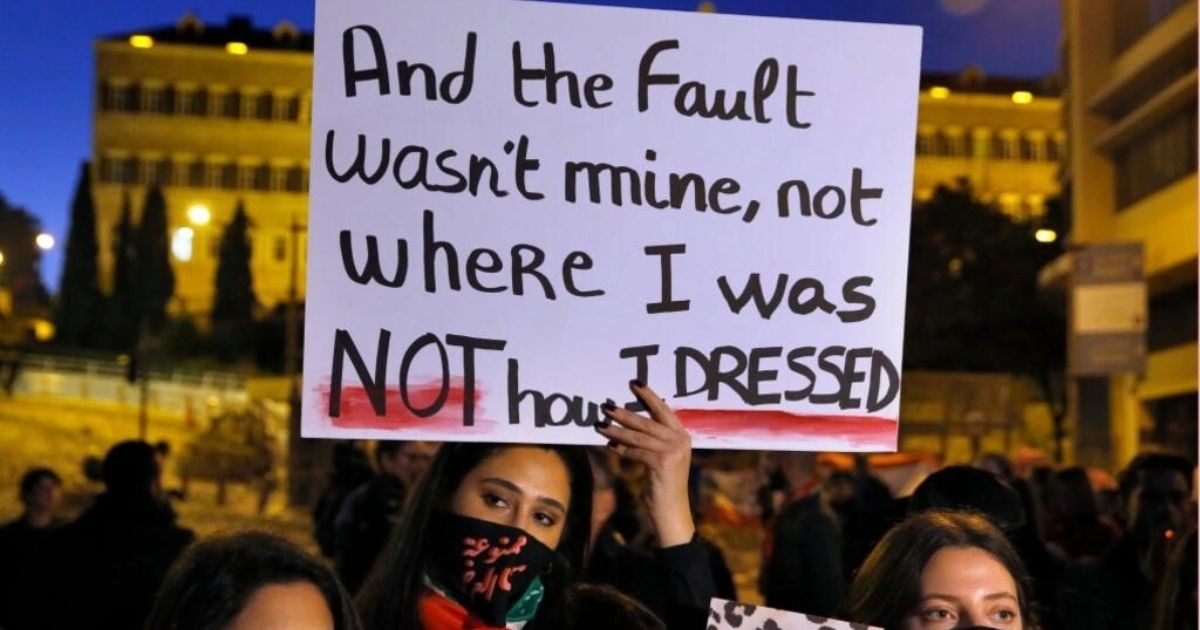The Lebanese public and NGOs expressed their outrage at the injustice in the Lebanese University’s decision to charge the tuition of children of Lebanese mothers married to foreign men in USD, deeming them foreign students.
With the dramatic devaluation of the Lebanese Pound and the scarcity of fresh USD for those residing in the country, these students are now thrown into an impossible situation that will deprive them of their education.
The decision, which was issued against all foreign students except Syrians and Palestinians residing in Lebanon, was approved and signed by the new Education Minister, Abbas El-Halabi.
Although the state refuses to date to acknowledge these children as Lebanese, most of whom reside in Lebanon, the people do deem them Lebanese by natural right of birth. They deserve equal treatment as their peers.
The NGO Lebanese Women’s Right to Nationality & Full Citizenship (Jinsiyati) rushed to release a strong statement as soon as the decision was confirmed on Friday.

It denounced and condemned “the discretionary of decisions that come from here and there to cast all kinds of discrimination on the families of Lebanese women and violate the right of their children in every decision, without taking into account the treatment of the children of Lebanese women in the same way as the children of Lebanese men.”
Blaming the political system, the organization accused it of failure and corruption, and of wanting to force Lebanese mothers, who live and work in the country on LBP salaries, to pay in foreign currency, hence “pay the bill many times over.”
They don’t “produce foreign currency” in the same country they live in like all other Lebanese just because their children are deemed “foreign” by the outdated bias law, the statement pointed out.
The organization went further charging against the system “nourished by all the male stereotypes and mentality” issuing decisions that only serve men “as if women are outside the space of this system.”
“Enough provocation, enough inhumanity, enough bullying. The children of Lebanese mothers are Lebanese, the homeland is Lebanon, the currency of the families of Lebanese women is Lebanese, and enough bad decisions…,” the NGO called out.
Omar Al-Hout, the president of the student council in Lebanon, condemned the decision, calling on both the president of the Lebanese University and the Education Minister to include these students in the exemption.
“It is unacceptable to deprive these students of their right to their educational attainment and to pay their registration fees in Lebanese pounds in the country in which they were born and raised,” Al-Hout stressed.
He called for “the adoption of a law on the right of Lebanese women to give their nationality to their children as a salvation from all these obstacles they endure.”
After their statement, the NGO Jinsiyati and several affected mothers went to pay a visit to the Education Ministry to make their voices heard and demand an enactment that exempts the children from this wrongful decision.
The demands were met with compliance, and the organization said that their request will be fulfilled this coming Monday.
The coordinator of the organization told Al-Modon that when they contacted earlier the office of the Minister of Education, the office said that exempting children of Lebanese mothers was “forgotten by mistake.”
The nationality law preventing children of Lebanese mothers married to foreigners from receiving the nationality dates back to 1925. In all cases, this law is much older than these children.
Besides Lebanese women being unable to pass the nationality to their children, they’re also unable to pass it onto their foreign spouses.
This is only imposed on Lebanese women. Lebanese men can normally pass the nationality to their children, and to their foreign spouses after a year of the wife residing in the country.
Families with a Lebanese mother and foreign father face a life of hardships in Lebanon.
Simply put, a child of a Lebanese father has rights that a child of a Lebanese mother doesn’t, even if both children are born in Lebanon and have been living in Lebanon ever since; unless the mother is married to a Lebanese citizen.
Back in September 2020, Human Rights Watch issued a statement condemning the decision by the Education Ministry to exclude these children from enrolling in public schools.
The given justification or excuse was the pressure of demands on public schools due to the economic crisis forcing parents to move their children from private to public schools.
However, such a decision has been back and forth on the ministerial table before the economic crisis, shaking the lives of these students and their families into constant instability.
It started with former Minister Elias Bou Saab. It was then changed by former Education Minister Akram Chehayeb under the activists’ pressure, to then exclude them again by a directive from Minister Tarek Majzoub.
These families’ hardships don’t end there. Their children don’t have access to public services, healthcare, and other rights given by the state to those with the nationality. They even need a residence permit to live in their own country.
And in this new case, they weren’t even granted the same beneficial right, let alone human compassion, as Palestinians and Syrians living in the country.
It is unfathomable, indeed, that the state-run Lebanese University and the new Education Minister didn’t even stop to consider them while drafting the document and/or when signing it, although they did take into compassionate consideration the exempted foreigners residing in Lebanon.
While promises of fixing this legislation were just given, the fact that they were “forgotten” in the exemption is only an example of how difficult life has been for them in their own country.
All because of an outdated law that the Lebanese policy-makers have been refusing to change for close to 100 years.
This law, which in essence and base, firstly discriminates against Lebanese women, is not the only one of its kind in Lebanon. The journey for equal rights has been long and of little results so far.

















